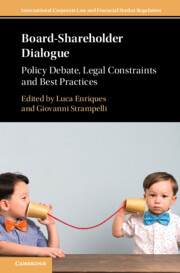Book contents
- Board-Shareholder Dialogue
- International Corporate Law and Financial Market Regulation
- Board-Shareholder Dialogue
- Copyright page
- Contents
- Contributors
- Foreword
- The Dialogue between Corporations and Institutional Investors
- 1 The New Corporate Governance
- 2 Shareholder Voice and Corporate Purpose
- 3 The Purpose of Corporate Purpose Statements
- 4 Systemic Stewardship with Tradeoffs
- 5 Giant Asset Managers, the Big Three, and Index Investing
- 6 Something Old, Something New
- 7 The Perils and Promise of Shareholders as Stakeholder Advocates
- 8 How to Facilitate ESG Investor Engagement
- 9 Emerging ESG-Driven Models of Shareholder Collaborative Engagement
- 10 ESG and Board-Shareholder Engagement in M&A
- 11 How Does Board-Shareholder Engagement Really Work?
- 12 Shareholder Engagement inside and outside the Shareholder Meeting
- 13 The Viability of Blockchain in Corporate Governance
- 14 Shareholder Engagement in East Asia
- 15 Board-Shareholder Engagement and Directors’ Appointments
- 16 Shareholder Proposals and the Debate over Sustainability Disclosure
- 17 Board-Shareholder Engagement and Disclosure Obligations under Corporate Governance Codes
- 18 Board-Shareholder Engagement and Insider Regulation
- 19 Market Soundings Rules
4 - Systemic Stewardship with Tradeoffs
Published online by Cambridge University Press: aN Invalid Date NaN
- Board-Shareholder Dialogue
- International Corporate Law and Financial Market Regulation
- Board-Shareholder Dialogue
- Copyright page
- Contents
- Contributors
- Foreword
- The Dialogue between Corporations and Institutional Investors
- 1 The New Corporate Governance
- 2 Shareholder Voice and Corporate Purpose
- 3 The Purpose of Corporate Purpose Statements
- 4 Systemic Stewardship with Tradeoffs
- 5 Giant Asset Managers, the Big Three, and Index Investing
- 6 Something Old, Something New
- 7 The Perils and Promise of Shareholders as Stakeholder Advocates
- 8 How to Facilitate ESG Investor Engagement
- 9 Emerging ESG-Driven Models of Shareholder Collaborative Engagement
- 10 ESG and Board-Shareholder Engagement in M&A
- 11 How Does Board-Shareholder Engagement Really Work?
- 12 Shareholder Engagement inside and outside the Shareholder Meeting
- 13 The Viability of Blockchain in Corporate Governance
- 14 Shareholder Engagement in East Asia
- 15 Board-Shareholder Engagement and Directors’ Appointments
- 16 Shareholder Proposals and the Debate over Sustainability Disclosure
- 17 Board-Shareholder Engagement and Disclosure Obligations under Corporate Governance Codes
- 18 Board-Shareholder Engagement and Insider Regulation
- 19 Market Soundings Rules
Summary
In recent years, shareholder driven climate activism has focused attention on “universal owners and managers” – asset owners and managers with significant stakes in all or nearly all public companies. Advocates push these asset managers to prioritize enhancing overall portfolio value over maximizing individual company value, promoting "systemic stewardship" even when it involves sacrificing individual firm value for the benefit of the overall portfolio. This chapter assesses whether universal owners can and should pursue such a strategy. Our analysis is pessimistic for three main reasons. First, inducing individual portfolio firms to reduce their carbon output to address environmental concerns may trigger a competitive response that will reduce gains for other portfolio companies. Second, current corporate law has a "single firm focus" that conflicts with the potential "multi-firm focus" of large portfolio investors and exposes corporate fiduciaries to potential liability if they sacrifice firm value for the benefit of investors’ other holdings. Third, universal owners, managing diverse portfolios for various clients, face conflicts with fiduciary duties and their multi-client business model when implementing a tradeoff strategy. Given these challenges, systemic stewardship strategies that entail substantial tradeoffs are unlikely to have any significant impact on mitigating climate change.
Keywords
- Type
- Chapter
- Information
- Board-Shareholder DialoguePolicy Debate, Legal Constraints and Best Practices, pp. 107 - 157Publisher: Cambridge University PressPrint publication year: 2024



